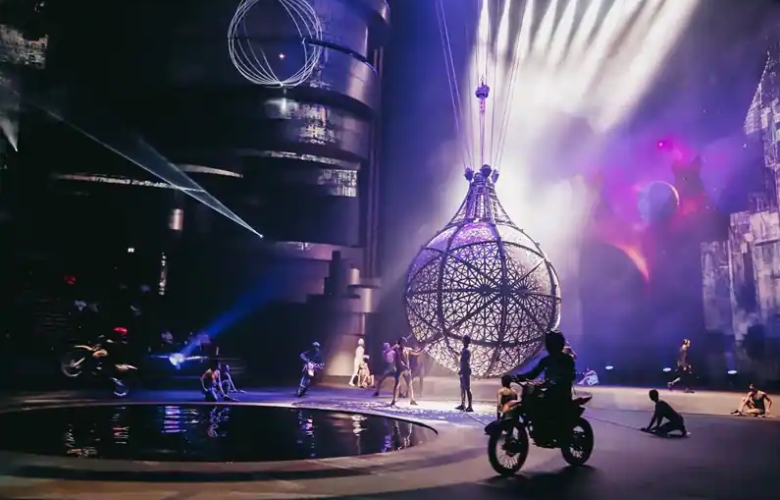
In this week’s edition, I am discussing the role we define for ourselves as a stage manager and nurturing a stage management style. We hold a pivotal position as a stage manager, acting as a conduit for the entire production, the glue that binds all elements together.
The analogy I use most is a bicycle wheel: there is a center wheel that connects the spokes to the outer part of the wheel. Stage Management is at the center wheel, and the spokes are all of the separate departments that connect to form the entire wheel, which makes up the whole production.
Collaboration forms the bedrock of any successful live performance production, and stage management serves as a vital bridge between various stakeholders. With our organizational skills and a keen eye for detail, we facilitate effective communication and ensure smooth collaboration among the director, designers, cast, and crew. By actively engaging in discussions and actively listening to different perspectives, we can promote an inclusive creative process that harnesses the collective talents of the team. There is no other department that touches all facets of a production, and through all phases of production like stage management does.
With that being said, it’s easy for someone from the outside to view a stage manager as the person holding all of the authority or being in a place of power. Stage Managers are categorized as middle managers who are facilitators, so this could not be further from what stage managers are. Attempting to lift the vail and demystify the role of a stage manager, I hope to define the key components of the position, discuss intangible concepts that define our roles, put into context how our roles actually work within a production, highlight the importance of being humble, and how embracing the unknown creates a lightness to our approach to leadership.
Read my article about building a stage management team if you’re interested in more about team building. We cannot all be good at the same skills, and our styles will be different. Those differences are what make a team strong and able to function in a wide variety of situations and through production phases that shift how we operate as stage managers and a team.
The argument about whether stage managers are artists or technicians comes up frequently, especially when I define how I see myself as a stage manager. There are many reasons why I would define myself as an artist and not a technician. But first, I want to address where the idea of being a technician might enter into the conversation. In my opinion, it comes from an old-fashioned, predominantly male-dominated profession where being tough and grasping at power to be in charge equates to holding authority, or dominance, over someone. At times, I’ve heard stage managers say things like, “They just need to do what we tell them,” or when mentioning how I see myself as an artist, “Oh, you’re one of those people.” In his article about the power of kindness, Niko Lambros Smith wrote about the kind of stage manager who has coffee mugs with the words “Actor Tears” on them or posters that say, “Let me pour you a tall glass of Get Over It,” which is often encountered many productions. The lack of openness to connect with the people we manage stifles our ability to be effective leaders.
While I acknowledge that stage managers come to this professional from many directions, some being technically driven and that stage managers are often expected to know a lot about technical nomenclatures with a nuanced understanding of how systems work together, the way we interact with the show is one of artistic performance more than mechanical prowess.
So, let me outline four reasons why I think stage managers should consider approaching stage management from an artistic-forward perspective rather than a purely technical one:
A humanistic approach wins over every time. I don’t mean to over-simplify that artistic is being human and being technical is being mechanical; however, having an artistic sensibility and knowing your audience (with artists, technicians, producers, VIPs, and other stage managers) will go a long way. Appeal to your audiences’ artistic sensibilities and what language they are speaking artistically.
Stage Managers are responsible for maintaining the show’s artistic integrity. It is typical that after a show opens, the director leaves and is not present to oversee the show artistically. Artistic maintenance is passed onto the stage management team. For all intents and purposes, the stage manager becomes the director. The stage manager not only schedules and runs all understudy rehearsals, new performer integrations, and replacements, they are the person for giving direction about their characters and the storyline of the show and offers feedback about performances. The stage manager takes notes about the show from an artistic perspective, including actor objectives, beats of a scene, and timing during rehearsals, alongside all of the other elements being interlaced from the start.
As stage managers, people look to us for answers, and it is easy to fall into the trap of “I must be right” and “I must be perfect, or I’m not a great stage manager.” It’s not important to be right. What matters is to get it right. Admitting when we are wrong or asking for help appears like we are weak and unable to lead with confidence. It actually takes courage to speak up and say, “I’m not really sure what to do here, I need help navigating this.” Knowing your weaknesses so you can lean on the stage management team and others around you takes self-awareness, practice, and courage to speak up.
It informs trust building, earning informal authority, and establishes what kind of leadership we intend to give.
Our role as a show caller is many things: time-keeper, a watchful eye, conductor of the flow of the show, and being present. One of the most important to me is being present to what is happening on stage, particularly shows that require calls on physical moment and timing like dance and circus. In a way, we are another partner for them during the show. I am in response to them, and they are in response to me. All shows are different, even shows that are done many times over and again. Performers get into different timings based on how they feel or what their bodies need. It’s the main reason why I see myself as an artist. We have to respond to humans on stage.
It’s easy to think about all of the admirable skills of a stage manager and what people expect to see from a successful stage manager. As I mentioned before, all stage managers are not created equally, so some might be better or need more practice at some of these. There are a multitude of skills not listed that are additions to what makes someone a great stage manager.
Technical Skills (hard skills)
Adaptive Skills (soft skills)
Throughout my experience as a stage manager, I have gained a deep understanding of the critical role stage management plays in the success of any production. And by also failing at leadership, I see what works most effectively. There are three words I would use to describe my role as a stage manager in any capacity:
Service
At the heart of the stage manager’s role lies the principle of service leadership. A stage manager is not just a supervisor but also a servant to the production and its participants. This approach requires humility and a deep understanding that success is measured by the collective achievements of the entire team. By prioritizing the needs and well-being of others, a stage manager fosters an environment of trust and support, empowering the cast and crew to give their best performances.
Translation
We are all focused on our piece of the pie and what we are adding to the production. As stage managers, we need to be aware of the language our collaborators are speaking and what will resonate with them, and how that relates to their stakes. It is extremely nuanced, but once you can identify someone’s stakes and what matters to them, you can understand how to effectively be able to translate what you need to tell them in terms that make the most sense to them. It becomes incredibly useful when you are passing information from one person to another with different stakes.
Orchestrator
Because of our position within the production and being at the center of information, we are orchestrators of information and knowledge. Creating a schedule with a complex execution or getting all departments together for a technical rehearsal that is successful takes careful and mindful consideration. It’s a masterpiece when it all aligns, and those are the kinds of moments that pay off for me as a stage manager.
Our roles as stage managers extend far beyond the logistical coordination, mouthpiece, and/or punching bag of a production. We serve as humble leaders, facilitating creative collaboration, exercising authority, translating communication, and courageously embracing our authentic selves. By giving leadership through the lens of service, translation, and orchestration (and many other ways), stage managers contribute to the success of productions around the world. We are the conductor of the theatrical orchestra, bringing together and ensuring a harmonious symphony that captivates audiences and leaves a lasting impact.
Also by Bryan Runion:
Authority, Power and Leadership
Inviting Feedback, Encouraging Diversity and Challenging Tradition


Bryan Runion is a professional Production Stage Manager whose credits include: Drawn to Life (Cirque du Soleil and Disney), Netflix’s Stranger Things: The Experience, Duel Reality (7 Fingers), La Perle (Dragone), The Voice of Tolerance (The Ministry of Education, UAE); Mastercard Experiences (Mastercard); Everybody Black (World Premiere), Queens (La Jolla Playhouse), Ken Ludwig’s The Gods of Comedy (The Old Globe), TEDx (Chula Vista), Mark Morris Dance Company, Joey Alexander Trio, Ukulele Orchestra of Great Britain (La Jolla Music Society), The Bridges of Madison County (Arkansas Rep). Bryan earn his M.F.A. at The University of California, San Diego and his B.A. at The University of Arkansas at Little Rock. He is a proud member of Actors’ Equity Association and The Stage Managers’ Association.
Read Full Profile© 2021 TheatreArtLife. All rights reserved.

Thank you so much for reading, but you have now reached your free article limit for this month.
Our contributors are currently writing more articles for you to enjoy.
To keep reading, all you have to do is become a subscriber and then you can read unlimited articles anytime.
Your investment will help us continue to ignite connections across the globe in live entertainment and build this community for industry professionals.